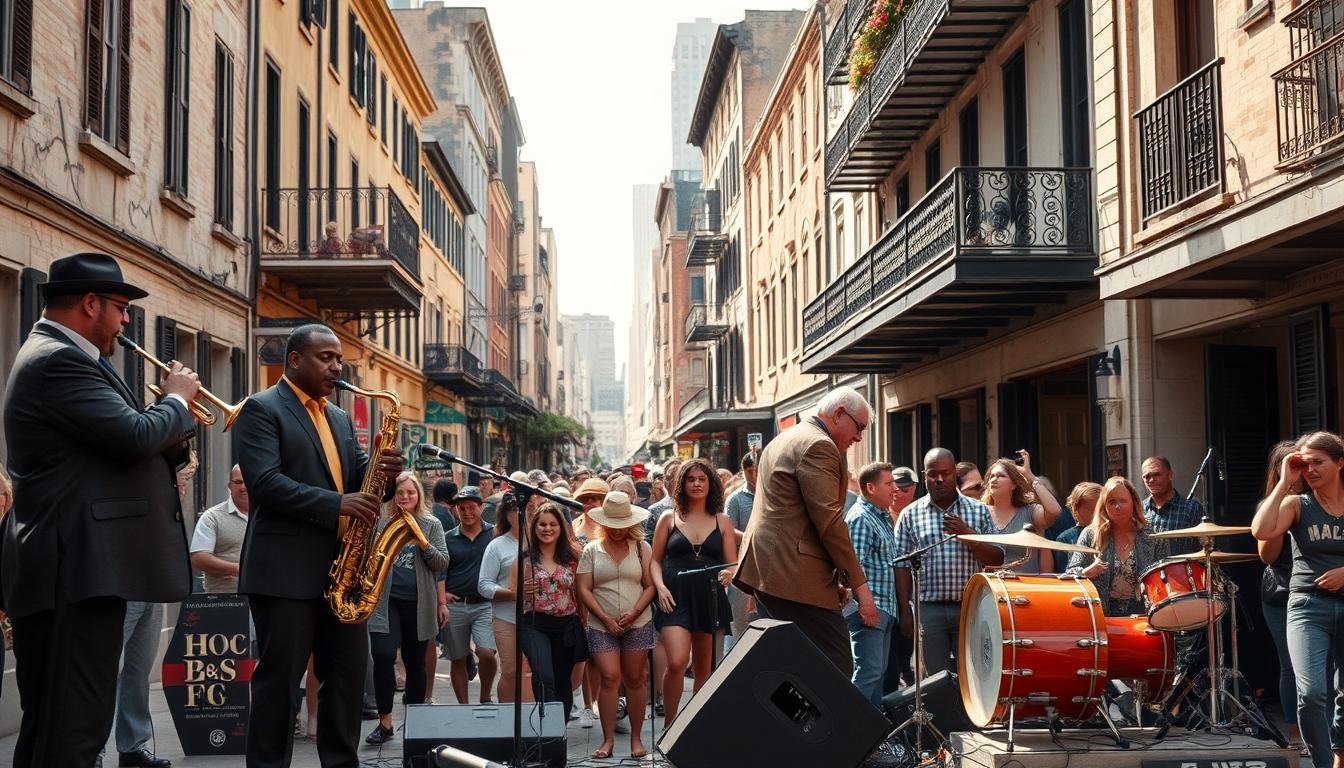As a local, I’m excited to share with you the rich musical heritage of New Orleans – a city that’s the birthplace of jazz and a melting pot of sounds and styles. Our city’s vibrant music scene is a reflection of its cultural diversity, with a blend of traditional and modern influences.
From iconic venues to talented artists, we’ll take you on a journey through the city’s best spots to experience live music. Whether you’re a local or just visiting, you’ll discover the unique cultural traditions that make our city so special.
Key Takeaways
- Explore the city’s iconic music venues and their significance.
- Discover talented local artists shaping the New Orleans music scene.
- Learn about the history and cultural heritage behind the city’s music.
- Find the best spots to experience live music in New Orleans.
- Understand the blend of traditional and modern influences in the city’s music.
The Rich History of New Orleans Music
Born from the blend of African and European traditions, New Orleans music has a unique story to tell. The city’s African American communities were the incubators of jazz, a genre that would go on to influence music globally.
The Birth of Jazz
Jazz in New Orleans was not just a genre; it was a way of life. It emerged in the late 19th and early 20th centuries, characterized by its improvisational nature, blend of African rhythms with European instrumentation, and a mix of blues and ragtime. Jelly Roll Morton and Louis Armstrong were among the pioneers who shaped this new sound.
- Improvisation was key to the development of jazz.
- Blues and ragtime were significant influences.
- Jazz became a symbol of New Orleans culture.
Influences from Other Genres
New Orleans jazz was not developed in isolation; it was influenced by various genres. Gospel music, with its emotive and soulful qualities, played a significant role. The city’s geographic location also made it a hub for Caribbean and Latin American musical influences. This blend of cultures enriched the jazz scene, making it more diverse.
The cultural melting pot of New Orleans was instrumental in shaping its music. The city’s unique position allowed for the exchange of musical ideas between different communities.
Notable Historical Venues
Several venues played a crucial role in the development and popularization of jazz in New Orleans. The Preservation Hall is one such iconic venue, dedicated to preserving traditional New Orleans jazz. Another significant spot was the Storyville district, known for its jazz clubs and dance halls.
These venues were not just places to listen to music; they were hubs for musical innovation and community gathering.
Iconic Music Venues in New Orleans
The French Quarter in New Orleans is a treasure trove of iconic music venues that have shaped the city’s musical identity. This historic neighborhood is where you’ll find some of the most legendary spots for live music, ranging from intimate jazz clubs to high-energy rock venues.
The French Quarter’s Best Spots
The French Quarter is home to a diverse array of music venues that cater to all tastes. Some of the most notable include:
- Preservation Hall: Dedicated to preserving traditional New Orleans jazz, this venue is a must-visit for any jazz enthusiast.
- Snug Harbor Jazz Bistro: Offers a sophisticated setting for live jazz performances.
- The Spotted Cat Music Club: A cozy venue featuring local jazz and blues musicians.
Live Music at Tipitina’s
Tipitina’s is one of the most iconic music venues in New Orleans, known for its lively atmosphere and legendary performances. This venue has played host to some of the biggest names in music and continues to be a staple of the local music scene.
Some of the key features that make Tipitina’s stand out include:
- A diverse lineup of local and national acts.
- A vibrant atmosphere that keeps audiences coming back.
- A commitment to supporting local musicians and the community.
Preservation Hall’s Role
Preservation Hall is a unique venue dedicated to the preservation and promotion of traditional New Orleans jazz. By providing a platform for local musicians to perform, Preservation Hall plays a crucial role in keeping the jazz heritage of New Orleans alive.
The venue’s intimate setting allows for a close connection between the performers and the audience, creating a truly immersive experience.
In conclusion, the French Quarter is a hub for live music in New Orleans, with venues like Tipitina’s and Preservation Hall leading the way. Whether you’re a local or just visiting, these iconic music venues are sure to leave a lasting impression.
Highlighting Local Artists and Bands
New Orleans is a melting pot of musical talent, with a thriving scene that showcases both emerging artists and established bands. The city’s unique cultural landscape has given rise to a diverse range of musicians, from jazz and blues legends to contemporary rock and hip-hop acts.
Emerging Talents
The New Orleans music scene is constantly evolving, with new and exciting artists emerging all the time. These musicians are pushing the boundaries of traditional genres, blending styles and creating fresh sounds that captivate audiences. Some notable emerging talents include artists who are making a name for themselves in the local music scene, such as Rebirth Brass Band and New Breed Brass Band, who are revitalizing the brass band tradition.
Established Names in the Scene
Alongside the newcomers, New Orleans is also home to a wealth of established artists and bands who have made significant contributions to the music world. These musicians have helped shape the city’s musical identity and continue to inspire new generations. Acts like Harry Connick Jr. and The Meters are just a few examples of the many talented artists who call New Orleans home.
Genres Represented
The New Orleans music scene is characterized by its incredible diversity, with a wide range of genres represented. From the soulful sounds of jazz and blues to the high-energy beats of rock and hip-hop, there’s something for every musical taste. The city’s unique cultural heritage has created a fertile ground for musical innovation, with many artists blending different styles to create something entirely new.
| Genre | Notable Artists/Bands | Venues |
|---|---|---|
| Jazz | Harry Connick Jr., Rebirth Brass Band | Preservation Hall, Jazz & Heritage Center |
| Blues | Jon Cleary, The Soul Rebels | House of Blues, Snug Harbor |
| Rock/Hip-Hop | The Meters, New Breed Brass Band | Tipitina’s, Howlin’ Wolf |
The table above highlights just a few examples of the many genres and artists that make up the vibrant New Orleans music scene. Whether you’re a local or just visiting, there’s always something new to discover in this musical city.
Festivals Celebrating Local Music
New Orleans is renowned for its vibrant music scene, and its festivals are a testament to this rich cultural heritage. The city’s music festivals are a big part of its identity, drawing in visitors from all over the world.
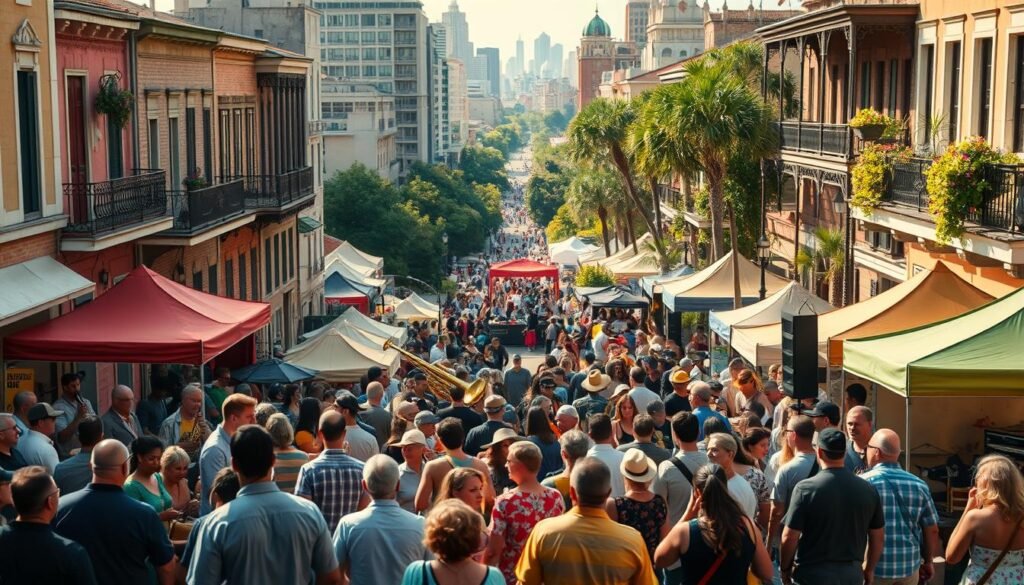
Jazz Fest Overview
The New Orleans Jazz & Heritage Festival, or Jazz Fest, is one of the city’s most iconic events. It celebrates the city’s musical heritage with a diverse lineup of local and international artists. From jazz and blues to rock and gospel, Jazz Fest has something for every music lover.
The festival also features local cuisine, crafts, and cultural exhibits, making it a comprehensive celebration of New Orleans’ unique culture.
The Essence of French Quarter Fest
French Quarter Fest is another highlight of New Orleans’ festival calendar. Held in the historic French Quarter, this free event showcases local music, food, and drink. It’s a celebration of the city’s vibrant culture and community spirit.
With multiple stages featuring different genres, French Quarter Fest is a great place to discover new artists and experience the city’s eclectic musical landscape.
Smaller, Unique Festivals
Beyond the major festivals, New Orleans hosts a range of smaller, unique events that celebrate specific genres or aspects of its musical heritage. These include festivals focused on brass bands, jazz funerals, and other local traditions.
These smaller festivals offer a more intimate experience, allowing attendees to connect closely with the music and the community.
| Festival | Genre | Attendance |
|---|---|---|
| Jazz Fest | Jazz, Blues, Rock | 70,000+ |
| French Quarter Fest | Local Music, Jazz | 20,000+ |
| Brass Band Festival | Brass Band | 5,000+ |
The Impact of Music on New Orleans Culture
In New Orleans, music serves as a unifying force that brings together diverse communities and celebrates the city’s unique cultural tapestry. The city’s rich musical heritage is not just a form of entertainment; it’s an integral part of the fabric that holds the community together.
Music as a Unifier
Music has a way of bridging gaps between different cultures and generations in New Orleans. Whether it’s a jazz performance in Preservation Hall or a brass band marching through the streets, music is a common language that everyone can understand and appreciate.
The city’s music scene is characterized by its ability to bring people together, creating a sense of community and belonging among locals and visitors alike. This is evident in the numerous community events and festivals that celebrate music as a central element of New Orleans culture.
How Music Shapes Local Identity
The unique sound of New Orleans is a reflection of its history, cultural influences, and the resilience of its people. Music plays a crucial role in shaping the local identity, with genres like jazz, zydeco, and gospel contributing to the city’s distinct cultural signature.
Key aspects of how music shapes local identity include:
- Preserving historical traditions through music
- Influencing local art and cultural expressions
- Fostering a sense of pride and community among residents
Community Events and Music
Community events in New Orleans are often centered around music, showcasing the city’s vibrant cultural scene. From the iconic Jazz Fest to smaller neighborhood gatherings, music is at the heart of these events, promoting unity and celebration.
These events not only highlight the city’s musical talents but also provide a platform for cultural exchange and community engagement. They are a testament to the enduring power of music in New Orleans, bringing people together and enriching the city’s cultural landscape.
Local Music Education and Opportunities
Music education is a vital part of New Orleans’ cultural fabric, with numerous programs and collaborations that help shape the next generation of musicians. The city’s rich musical heritage is not just preserved through its history, but also through active educational initiatives that keep the spirit of jazz, blues, and other genres alive.
Programs for Aspiring Musicians
Several organizations in New Orleans offer programs specifically designed for aspiring musicians. For instance, the New Orleans Jazz & Heritage Foundation provides various educational programs, including instrument instruction and music theory classes. These programs are crucial in nurturing young talent and providing them with the skills needed to succeed in the competitive music industry.
Additionally, institutions like the New Orleans Center for Creative Arts (NOCCA) offer high school students intensive training in music, along with other arts disciplines. NOCCA has a long history of producing talented musicians who go on to make significant contributions to the city’s music scene.
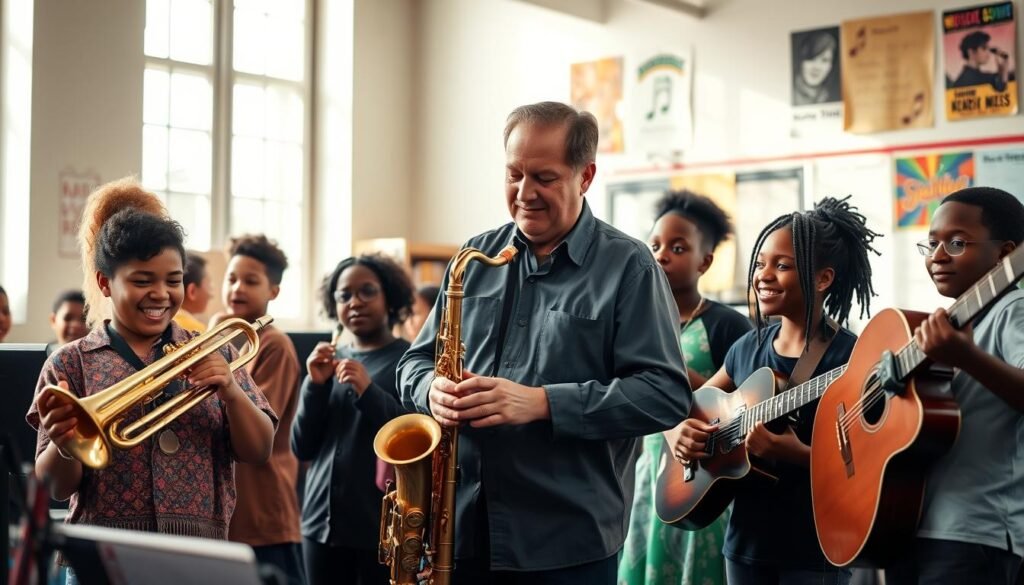
Collaborations with Local Schools
Collaboration between music programs and local schools is a key aspect of music education in New Orleans. Many music organizations work closely with schools to integrate music education into the curriculum, providing students with a well-rounded musical education. For example, the New Orleans Musician’s Guild works with local schools to develop music curricula and provide performance opportunities for students.
These collaborations not only enhance the musical skills of students but also help in preserving the city’s musical heritage by passing it down to the next generation.
Workshops and Master Classes
Workshops and masterclasses are another vital component of music education in New Orleans. These sessions, often led by experienced musicians, provide valuable insights and hands-on experience for aspiring musicians. They cover a range of topics, from performance techniques to music production, and offer participants the chance to learn from the best in the industry.
Events like the Jazz & Heritage Festival also include workshops and masterclasses as part of their programming, further enriching the educational landscape for local musicians.
The Influence of Music on Tourism
From jazz clubs to lively festivals, music is a major draw for visitors to New Orleans, contributing significantly to the local economy. The city’s rich musical heritage is not just a form of entertainment; it’s a significant tourist attraction that sets New Orleans apart from other destinations.
Visitor Experiences in Local Venues
New Orleans is renowned for its live music venues, offering a diverse range of experiences for visitors. From the historic jazz clubs in the French Quarter to modern concert halls, there’s something for every music lover. Some must-visit spots include:
- Preservation Hall for an intimate jazz experience
- Tipitina’s for a taste of the local rock and roll scene
- The Spotted Cat Music Club for eclectic performances
These venues not only showcase local talent but also provide a glimpse into the city’s vibrant music culture, making them a crucial part of the tourist experience.
Music as a Marketing Tool
The city’s music scene is a powerful marketing tool, attracting tourists through various channels. Social media campaigns often feature the city’s jazz and music heritage, enticing potential visitors with the promise of unique musical experiences. Local businesses also capitalize on this by promoting music-related events and packages, further enhancing the city’s appeal.
Key marketing strategies include:
- Highlighting unique musical experiences in promotional materials
- Partnering with musicians and venues for exclusive offers
- Utilizing social media to showcase the city’s vibrant music scene
How Festivals Drive Tourism
New Orleans is famous for its festivals, with the New Orleans Jazz & Heritage Festival being a prime example. This and other festivals draw large crowds, boosting the local economy through ticket sales, accommodations, and dining. The festivals also provide a platform for local artists, further enriching the city’s cultural landscape.
Some of the ways festivals drive tourism include:
- Attracting large, international crowds
- Promoting local businesses through sponsorship and partnerships
- Creating a unique, festive atmosphere that encourages repeat visits
In conclusion, music plays a pivotal role in New Orleans’ tourism industry, from the allure of live venues to the grandeur of festivals. By continuing to celebrate and promote its rich musical heritage, the city can attract more visitors and maintain its status as a premier tourist destination.
The Role of Technology in Local Music
Technology has revolutionized the New Orleans music scene, offering local artists new avenues to showcase their talent. The city’s musicians are now able to reach a global audience, thanks to advancements in digital technology.
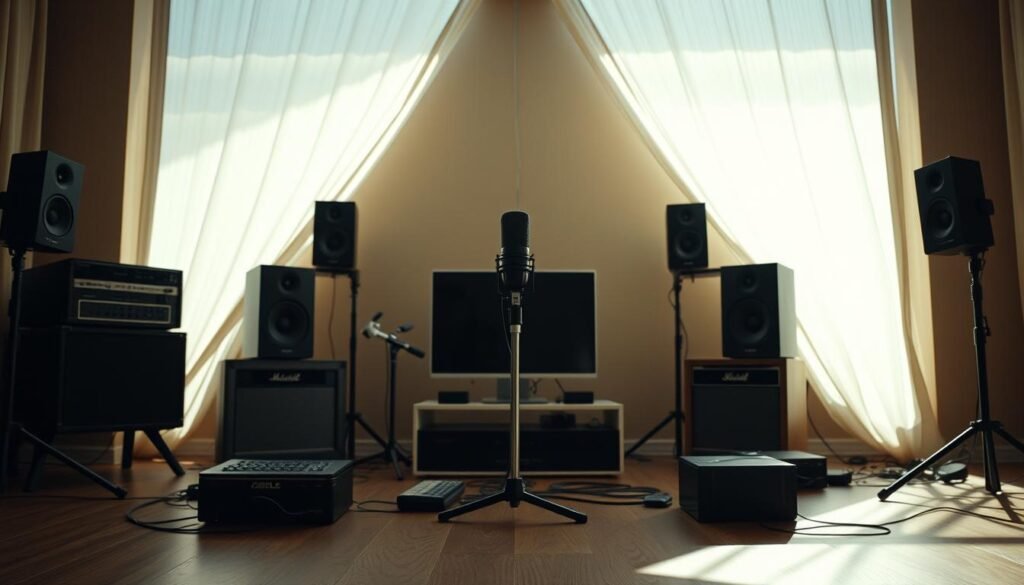
Streaming Platforms and Local Artists
Streaming platforms have become a crucial tool for local artists, allowing them to distribute their music worldwide. Platforms like Spotify, Apple Music, and Bandcamp have democratized music distribution, giving New Orleans musicians a global stage.
Many local artists are leveraging these platforms not just to share their music but to build a fanbase. By analyzing streaming data, artists can understand their audience better and tailor their marketing efforts accordingly.
Social Media Promotion
Social media has transformed how local musicians promote their work. Platforms like Instagram, Facebook, and Twitter enable artists to engage directly with their audience, share their creative process, and build a personal brand.
Effective social media promotion involves more than just posting music; it’s about creating a community. Local artists are using these platforms to share behind-the-scenes content, upcoming show announcements, and personal stories, fostering a deeper connection with their fans.
Virtual Concerts and Livestreams
The COVID-19 pandemic accelerated the adoption of virtual concerts and livestreams in the music industry. In New Orleans, musicians and venue owners quickly adapted, using platforms like YouTube Live, Facebook Live, and StageIt to continue performing for their audiences.
Virtual concerts have opened new revenue streams for local artists and have allowed them to reach fans who might not be able to attend live shows. While the experience differs from live performances, virtual concerts have become a valuable tool in the musician’s toolkit.
Collaborations Between Musicians
The collaborative efforts between musicians in New Orleans are a testament to the city’s enduring musical legacy. In a city where jazz, blues, and rock ‘n’ roll converge, the opportunities for creative fusion are endless.
Cross-Genre Collaborations
One of the most exciting aspects of New Orleans’ music scene is the cross-genre collaborations that take place. Musicians from different backgrounds come together to create unique sounds that blend the city’s rich musical heritage with modern influences. For instance, the New Orleans Jazz Orchestra has collaborated with artists from various genres, resulting in innovative performances that push the boundaries of traditional jazz.
These collaborations not only enrich the musical landscape but also provide a platform for artists to experiment and grow. As Harry Connick Jr. once noted, “The beauty of New Orleans music is its ability to blend different styles and create something entirely new.”
Community Projects
Community projects are another vital aspect of collaborations in New Orleans. Initiatives like Music Together bring together musicians, educators, and families to foster a love of music in children. Such projects highlight the role of music in building community and promoting social cohesion.
- Community music programs that provide instruments and lessons to underprivileged children.
- Collaborative concerts that bring together musicians from different genres and backgrounds.
- Music festivals that celebrate the diversity of New Orleans’ musical heritage.
Noteworthy Collaboratives
Some collaborations stand out for their innovation and impact. For example, the Rebirth Brass Band has collaborated with artists like Kendrick Lamar and Pharrell Williams, introducing their energetic sound to new audiences. Such collaborations not only elevate the profile of local musicians but also contribute to the city’s vibrant cultural scene.
“New Orleans is a city that’s all about collaboration and community. When musicians come together, the music just happens.” –
These collaborations between musicians in New Orleans are a testament to the city’s status as a hub for musical innovation and creativity. As the city continues to evolve, one thing remains constant: the power of music to bring people together.
The Future of New Orleans Music
The future of New Orleans music is bright, with emerging trends and talents shaping the city’s soundscape. As we look ahead, it’s clear that the city’s rich musical heritage will continue to evolve, influenced by new technologies, changing cultural landscapes, and the creativity of its musicians.
Emerging Trends
One of the most significant trends in the New Orleans music scene is the blending of genres. Artists are increasingly combining traditional jazz with modern styles such as hip-hop, electronic, and rock music. This fusion is creating a unique sound that is both rooted in the city’s history and forward-looking.
Another trend is the rise of independent artists and labels. With the advent of digital music platforms, musicians can now reach a global audience without the need for traditional record label support. This democratization of music distribution is empowering local artists and contributing to the diversity of the New Orleans music scene.
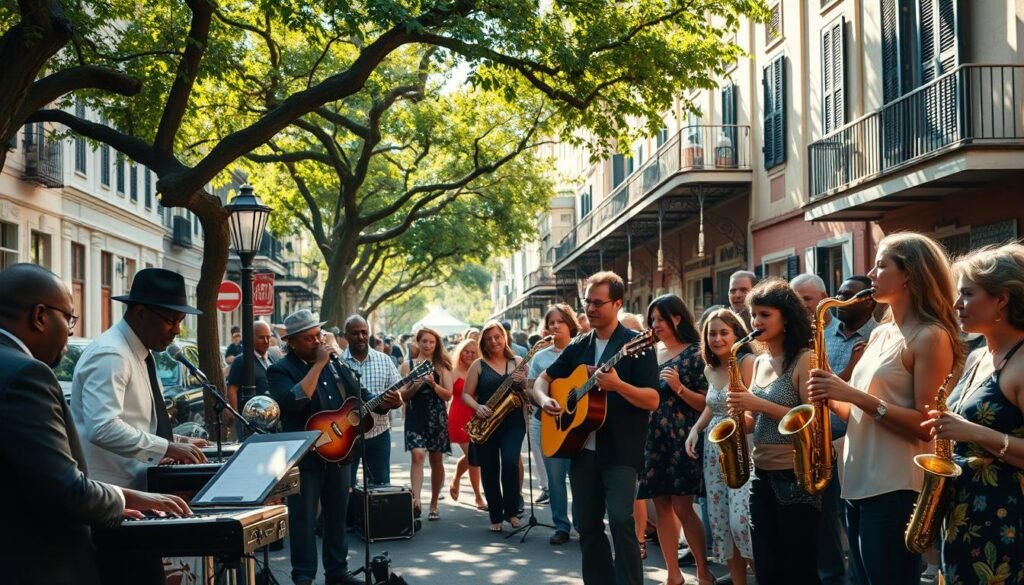
The Changing Soundscape
The soundscape of New Orleans is changing, driven by both internal creativity and external influences. The city’s music scene is becoming more diverse, with a wider range of genres represented. This diversity is reflected in the variety of venues, from traditional jazz clubs to modern concert halls and outdoor spaces.
The impact of technology cannot be overstated. Streaming services and social media platforms are not only changing how music is consumed but also how it is created and promoted. Artists are using these tools to connect directly with their audience, share their music, and build their brand.
Predictions for the Future
Looking ahead to the next decade, it’s likely that New Orleans will continue to be a hub for musical innovation. We can expect to see further genre-bending, with artists incorporating elements from a wide range of musical traditions into their work.
| Trend | Description | Impact |
|---|---|---|
| Genre Fusion | Blending of traditional jazz with modern styles | Unique sound, global appeal |
| Independent Artists | Rise of artists and labels outside traditional structures | Diversity, global reach |
| Technological Advancements | Use of digital platforms for music distribution and promotion | Direct artist-audience connection, new business models |
As the music scene evolves, it’s essential for the community to support local artists, venues, and initiatives that preserve the city’s musical heritage while embracing innovation. By doing so, New Orleans will remain a vibrant and dynamic music city, attracting visitors and inspiring musicians for generations to come.
Supporting Local Music Stores and Shops
Local music stores in New Orleans are more than just retail spaces; they’re hubs that foster community and creativity. These stores have been the backbone of the city’s music scene, providing musicians with the tools they need to create and perform.
Vinyl and Instrument Stores
The city is dotted with specialty stores that cater to vinyl collectors and musicians alike. Vinyl Records stores like Peaches Records offer a vast selection of new and used vinyl, a treasure trove for music enthusiasts. For musicians, stores like New Orleans Musician’s Supply provide high-quality instruments and equipment, ensuring that the city’s music keeps flowing.
“New Orleans is known for its rich musical heritage, and our local music stores play a crucial role in preserving that legacy,” says a local musician.
The Role of Music Retailers
Music retailers in New Orleans do more than just sell instruments and music; they are integral to the local music ecosystem. They host workshops, sponsor local events, and often provide a platform for emerging artists to showcase their talent. By supporting these local businesses, the community is able to maintain its vibrant music scene.
Local Merchandise and Memorabilia
For fans and collectors, local music stores offer a range of merchandise and memorabilia. From T-shirts and posters to rare collectibles, these items allow fans to take a piece of the New Orleans music scene home. Stores like Preservation Hall Store offer unique items that celebrate the city’s musical heritage, making them a must-visit for anyone looking to experience the authentic spirit of New Orleans music.
By supporting local music stores, both locals and visitors can contribute to the ongoing vitality of New Orleans’ music culture. Whether you’re a musician looking for the perfect instrument or a fan seeking out rare vinyl, these stores are essential to the city’s identity.
How to Experience New Orleans Local Music
To truly immerse yourself in New Orleans’ vibrant music scene, start by exploring the city’s best music spots. From legendary venues like Preservation Hall to lively spots in the French Quarter, there’s no shortage of live music venues in New Orleans to discover.
Discovering New Talent
Keep an ear out for emerging artists at smaller venues and festivals – you might stumble upon the next big thing in New Orleans local music. Local music stores and shops are also great resources for finding new talent and learning about the city’s rich musical heritage.
Live Shows and Events
Attending live shows and events is a must when experiencing New Orleans music. From intimate performances at Tipitina’s to the energy of Jazz Fest, there’s always something happening in the city’s music scene.
Engaging with the Community
Engage with the music community by attending workshops, taking music classes, or simply striking up a conversation with local musicians. This will give you a deeper understanding of the city’s musical culture and help you appreciate the talent that makes New Orleans so unique.
FAQ
What’s the best way to experience live music in New Orleans?
To experience the best of New Orleans live music, visit iconic venues like Preservation Hall, Tipitina’s, or the Spotted Cat Music Club, and attend music festivals like Jazz Fest and French Quarter Fest.
What are some must-visit jazz clubs in New Orleans?
Some of the top jazz clubs in New Orleans include Preservation Hall, the Spotted Cat Music Club, and Snug Harbor Jazz Bistro – each offering a unique jazz experience.
How can I discover emerging musicians in New Orleans?
To discover emerging musicians, check out local music venues, attend smaller festivals, and follow local music blogs and social media groups focused on the New Orleans music scene.
What role does music play in New Orleans culture?
Music is a vital part of New Orleans culture, serving as a unifier, shaping local identity, and contributing to the city’s unique cultural heritage through community events and celebrations.
Are there music education programs for aspiring musicians in New Orleans?
Yes, New Orleans has various music education programs, including collaborations with local schools, workshops, and masterclasses that provide opportunities for aspiring musicians to develop their skills.
How do music festivals impact tourism in New Orleans?
Music festivals like Jazz Fest and French Quarter Fest drive tourism by showcasing the city’s rich musical heritage, attracting visitors from around the world, and providing a unique experience that combines music, culture, and local cuisine.
What’s the significance of local music stores in New Orleans?
Local music stores, including vinyl and instrument shops, play a crucial role in supporting local musicians, providing a platform for music enthusiasts, and contributing to the city’s vibrant music ecosystem.
How has technology influenced the New Orleans music scene?
Technology has transformed the New Orleans music scene by providing local artists with platforms to reach new audiences through streaming services, social media, and virtual concerts, changing the way we discover and engage with local music.
